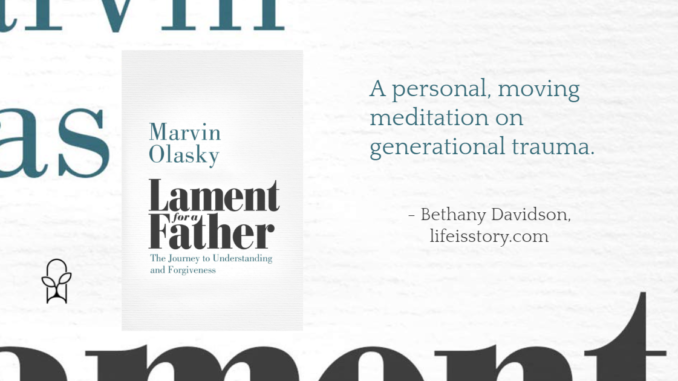
Also by this author: Pivot Points: Adventures on the Road to Christian Contentment
Published by P & R Publishing on June 2, 2021
Genres: Non-Fiction, Memoir
Buy on Amazon
Goodreads

Marvin played catch with his father, Eli, only once--it didn't end well. Eli never laughed, rarely spoke with his son, and was periodically lambasted by his wife for his lack of ambition. How had a Harvard graduate failed to achieve all that he had once hoped for?
Now an experienced investigative journalist, Marvin Olasky uncovers the true story of his father's past in his most personal work to date--facing Eli's pain and his own in order to understand and forgive. He follows Eli from his Orthodox Jewish childhood in Boston to his days as a commuter student at Harvard to his traumatic experiences in Germany following World War II to his embrace of Reconstructionist Judaism, describing a "spiritual and psychological death by one thousand cuts"--and discovering what he owes to his parents.
I grew up reading World magazine, which Marvin Olasky contributes to and edits, and I appreciate his investigative journalism and opinion pieces. Because I remember him writing some about his frustrations and strained relationship with his late father, I knew that I wanted to read this book, in which he deeply explores his father’s story to try to understand him. This is a very unique memoir, since it combines the author’s personal experience with investigative research, which included looking at school records and assignments from his father’s time in Harvard. The book deals with a variety of different themes related to troubled family dynamics and marital discord, and delves into Olasky’s father’s experience with anti-Semitism, disillusionment at Harvard, World War II traumas, and a changing view of faith, in which he came to see Judaism from a primarily cultural and not religious standpoint.
Olasky writes with deep sensitivity to what his father may have thought and felt at different times, without any unfounded speculation. The book can seem somewhat vague, since Olasky cannot fill in all of the sensory or emotional details of events that occurred before his birth, but he turned up enough information to write about his father’s past with clarity and detail, creating a sense of time and place while helping himself and his readers see how his dad became the frustrated, emotionally detached man that he knew while growing up. He also shares information about other family members’ traumatic backgrounds, and about the peace he has found in God’s grace and mercy, knowing that generational trauma can end, and that he doesn’t have to scapegoat older family members to find meaning in his story. He also writes briefly at the end about the circumstance of his conversion to Christianity.
Lament for a Father: The Journey to Understanding and Forgiveness is a very unique book, and even though the story it covers is very particular, it addresses universal themes within its very direct specifics. I appreciated this book from a historical perspective, especially with the specific details related to early twentieth century Jewish life and mid-century transitions after World War II, but even if someone isn’t interested in the historical element, the book’s emotional core will resonate with those who have experienced similar family struggles or witnessed them in others’ lives. This book is a moving meditation on the significance of generational trauma and what it means to lament the hurts that others have inflicted while also having compassion for them.
